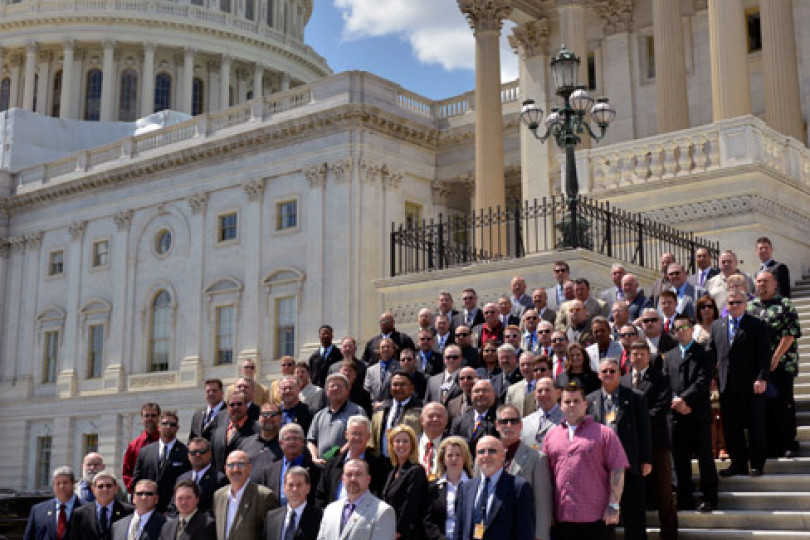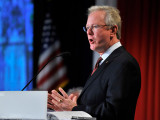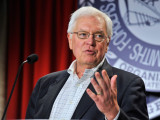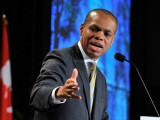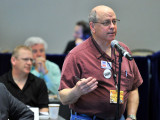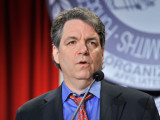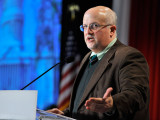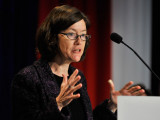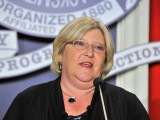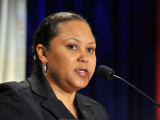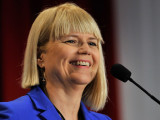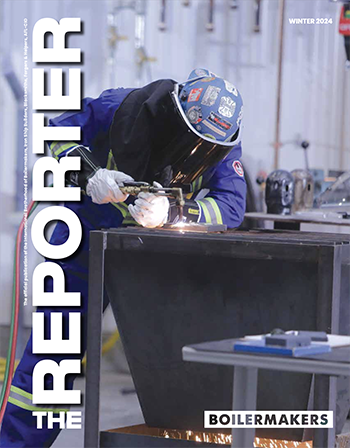Boilermakers honor lost brothers, prep for election year struggle
THE MOOD AT the Boilermakers’ 2012 LEAP conference April 23-26 alternated between somber reflection to downright anger, punctuated by periods of laughter and inspiration. It was a strange mix of emotions, to be sure, but there was much to trigger strong feelings.
Mike Autry, business manager of Local 40 (Elizabethtown, Ky.), inspired delegates with a stirring rendition of the National Anthem. Mike Allen, business manager of Local 263 (Memphis, Tenn.), followed with an earnest prayer before summoning Bridget Martin to receive a memorial plaque honoring the late Abe Breehey.
Abe’s memory was invoked repeatedly at the conference. The event was dedicated in his honor, and 2012 marked the first presentation of the Abe Breehey Legislator of the Year Award (see related story on page 1 ).
A popular and accomplished legislative director for the Boilermakers, Abe’s unexpected death on April 14, 2011, at the age of 34, stunned all who knew him. His absence continues to be felt.
Attacks against labor worsen, says IP Jones
BEFORE MAKNG HIS official presentation to the delegates, International President Newton B. Jones took time to honor Abe as well as the late Mark Ayers, President of the Building and Construction Trades Department, AFL-CIO. The two men, who died a year apart (Ayers on April 8, 2012), made substantial contributions to the cause of unionism.
“Republicans and their allies seek nothing less than to dismantle government and destroy labor unions. — IP Newton Jones
Jones referred to Abe as “a bright light gone out too soon.” He called Ayers one of organized labor’s “most stellar leaders.”
In his prepared remarks, Jones reflected on two previous addresses he had given to the LEAP conference, in 2010 and 2011, in which he castigated the Republican Party for its partisan obstructionism and assaults on labor. He noted that today things have gotten even worse.
“We face an opponent who — without shame and with callous disregard for the poor and middle class — seeks to bend this society to the will of big business and the very Wall Street banks that caused the Great Recession. The harsh reality is that Republicans and their allies seek nothing less than to dismantle government and . . . destroy labor unions.”
Jones expressed dissatisfaction with the ineffectiveness of congressional Democrats to counter the Right’s oppression, but he applauded the groundswell of union resistance, from Wisconsin, across the nation’s “rust belt,” to New Hampshire.
He noted that the Boilermakers union and other labor organizations have been frustrated at times with the Obama administration. “But with a few exceptions . . . he has taken our side and had our back.”
That cannot be said for the GOP’s presumptive candidate for president, Mitt Romney, Jones added. “Mr. Romney does not believe in prevailing wage laws, project labor agreements, and a whole host of other labor protections. I can assure each and every one of our members, our union has no friend in Mitt Romney.”
Bill Press contrasts Obama, far right
“I’VE GOT THE best job in the world,” Bill Press told Boilermaker delegates. “I listen to Rush Limbaugh so you don’t have to.”
Press was only half-joking. As a radio commentator and host of “The Bill Press Show,” a big part of his job is staying current with rhetoric from both the left and the right. He has long been involved in political debate and once co-hosted CNN’s popular “Crossfire” television program.
“I listen to Rush Limbaugh so you don’t have to.” — Bill Press
Press contrasted President Obama’s record with that of the far right, noting that the very first bill Obama signed into law was the Lilly Ledbetter Fair Pay Act, which gives women more time to file suit over pay discrimination. Press also cited Obama for “saving the American auto industry,” noting that Mitt Romney had argued to let it go bankrupt.
While Obama saved General Motors and Chrysler from the abyss and created millions of jobs through his stimulus program, Congressional Republicans have not offered a single job-creating bill, Press said. “They would rather talk about birth control and tax cuts for the wealthiest Americans than pass a real jobs bill.”
Delegates show anger at diminished coal focus
WHILE LEAP SESSIONS covered many topics important to Boilermakers, it was clear that one, in particular, had delegates fired up — and several speakers felt the heat.
“We haven’t heard anything about coal in two years. It’s like coal can’t be mentioned.” — IR Jim Cooksey
Patrick Gaspard, Executive Director of the Democratic National Committee, heard some impassioned remarks during a question-and-answer period. Gaspard had finished a discussion about the upcoming presidential election and opened the microphones for questions, when the subject turned to coal.
Members spoke about coal-fired power plant closings, anti-coal environmental groups, and strict new rules from the Environmental Protection Agency.
“During [Obama’s election campaign in 2008] we heard a lot of talk about clean coal, but we haven’t heard anything about coal in two years,” said International Rep Jim Cooksey. “It’s like coal can’t be mentioned. In the West, our coal plants are shutting down. We’re getting a lot of feedback from our members against the administration because they see their jobs going out the window. I hope you can relay that.”
Local 11 President Bob Winger, a lifelong Democrat who is running for the state House in Montana, told Gaspard, “I’m tired of [the party’s] allegiance to the Sierra Club.” He said the environmental group is “fighting any new coal-fired power plant,” no matter how much their carbon footprint is reduced through advanced technology. “We have spent our careers cleaning up coal [to lower emissions], and it creates the kind of jobs this country needs,” he added.
Dale Mason, assistant business manager and dispatcher for Local 502 (Tacoma, Wash.), said he normally dispatches about 400 people each spring for power plant outages. “Friday [April 20], I dispatched 25 people. They’re closing those plants down. It is killing our trade. We need help.”
Dan Engle, Local 28 (Newark, N.J.), said the plant closing in Bangor, Pa., is destroying the community. “Seventy-five percent of my town works at the coal plant. They’re all going to be out. Plus, small businesses are going to be out. My wife is a teacher. She’s going to lose her job because of the lost tax base. Companies need some kind of incentive to invest in environmental controls.”
Another speaker to hear from delegates was Joe Goffman, senior counsel to the Assistant Administrator for Air and Radiation at the Environmental Protection Agency. In his presentation, Goffman discussed the recent EPA regulations targeting coal-fired power plants. The cost of complying with those regulations has been a major factor in plant closures.
Jack Tuttle, Local 449 (Sturgeon Bay, Wis.) expressed his concerns with the EPA regulations, telling Goffman, “With the existing plants that are online right now and the EPA standards set where they are, some of the plants can’t reach your target numbers in order to be in compliance. So they’re shutting down, and when they shut down, we lose members that are working those plants. We’ve already lowered the emission standards. We’ve come a long way from 10 or 15 years ago. Give us some additional time to let the technology catch up before we spend all the money to get into compliance and then say, well, that’s not good enough.”
Gary Evenson, Director of Construction Organizing Services, summed up the frustration that many construction Boilermakers feel with the excessive lawsuits and the aggressive, anti-coal posture of environmental groups. He told Goffman, “Recently the Sierra Club and the Center for Biological Diversity have been bragging about a list of power plants they’ve shut down. The new push is solar and wind. Now I just read in the paper yesterday, they are trying to shut down a wind turbine plant in California because it’s killing golden eagles and condors. They’re trying to shut down solar power plants because they’re shading the desert floor and disturbing desert tortoises. They don’t like nuclear power. They want to decommission every dam in this country. Has anyone from the Sierra Club or any of the environmental groups [identified for] the EPA an acceptable form of power generation — or do they even have one?”
Presenter Scott Segal expressed empathy for the Boilermakers union. A partner with the law firm of Bracewell & Giuliani LLP, Segal has worked in coordination with the Brotherhood over legislative and regulatory issues over the years.
Segal argued that, in practice, coal is being excluded from the “all of the above” energy strategy articulated by the administration.
He said of the EPA, “They don’t like coal-fired power,” and the recent spate of regulations will make it nearly impossible to build new plants.
By his firm’s estimates, the Mercury and Air Toxics Standards (MATS) rule alone will result in 183,000 lost jobs each year, incur annual compliance costs of $21 billion, and increase electricity by double digits in some regions of the country.
Speakers rally support for 2012, warn of voter suppression
MARY BETH MAXWELL, a senior advisor with the U.S. Department of Labor, reminded Boilermakers of the strong support President Obama has shown for organized labor, from his appointment of labor advocate Hilda Solis to the DOL, to his support of the auto industry, to his investments in clean energy.
Maxwell said that, under Solis, the DOL “is back in the enforcement business. We hired hundreds of new investigators. The DOL has recovered nearly $600 million in back wages for over 700,000 workers.” She noted that the department has taken an aggressive role in defending Davis-Bacon and enforcing OSHA regulations.
She said President Obama, “has never stopped pushing to get Americans back to work” and has made a record investment in clean coal technology.
Doris Crouse-Mays, President of the Virginia AFL-CIO, told delegates that the 2012 election is about values and which vision of America is best for workers. Is it more important, she asked, “for people to work hard at one job and achieve the American dream, or is it more important to protect multinational corporations and the wealthiest 400 families at the expense of everyone else?”
Mays said “working people are being worn down by the agenda of the one percent — by their cuts in education and infrastructure, and by corporations shipping our jobs overseas, and by a continuous race to the bottom.”
She praised Cecile Conroy, the Brotherhood’s Legislative Director, for her service as Virginia’s Labor 2008 state director, helping to move the state into the Democratic column for the first time in 44 years.
“I’m very proud of her, and you should be, too.”
Cindy Smalls, the AFL-CIO’s National Voter Protection Manager, explained the danger of voter suppression in the 2012 elections. She said that since the 2010 mid-term elections, which saw the GOP win a majority in the U.S. House, close the gap in the U.S. Senate, and move many state legislatures and governorships to GOP control, a growing movement has been under way to make it more difficult for people to vote.
Smalls said the right-wing organization ALEC (American Legislative Exchange Council) has largely been behind the voter suppression effort, with numerous states introducing voter-restrictive legislation.
She said such laws tend to affect “people of color, low-income American workers, young people, students, and Americans with disabilities.”
Advocate links labor’s future to women in public office
“WOMEN ARE FAR better on labor issues than guys are, on average,” Siobhan “Sam” Bennett told delegates, during a presentation about the Women’s Campaign Fund, an organization that seeks to put more women in public office. What is more, Bennett claims that electing more women is the solution to a shrinking labor movement.
“Women are far better on labor issues than guys are, on average,” — Sam Bennett
Bennett serves as the Fund’s president and CEO. An accomplished business woman, community activist, and past political candidate for local and national offices, she is a frequent guest on national news shows.
Bennett cited a recent study about women and politics to back up her assertions. She said the study shows that women, regardless of party affiliation, are more likely to support labor issues because they “tend to care a lot more than men do about” equal pay, family leave, education, health care for all, and other issues vital to unions.
The problem is that women are reluctant to get into politics, even when they are more qualified than their male counterparts, she said.
“The U.S. is ranked 97th in the world in the number of women in elected office; we are behind Cuba and Afghanistan. And you tell me why the labor movement is under fire!”
Bennett heads an initiative called She Should Run (at sheshouldrun.org) that identifies and promotes women for office. With 200,000 names to date, her goal is to reach one million.
“If we had tens of thousands of labor women stepping up and running for office at all levels, labor’s future would be assured. You have to become the ones that ask these women. You have to ask them often, and you have to ask them repeatedly, and then you have to tell us about them.”
